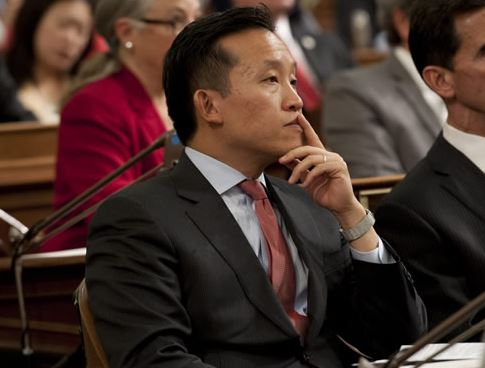
SACRAMENTO, Calif., – Assemblymember David Chiu (D – San Francisco), Chair of the Assembly Committee on Housing and Community Development, was today joined by Assembly Speaker Anthony Rendon (D-Paramount) and Assembly colleagues to push for solutions to the housing affordability crisis that threatens California’s economy and makes life difficult for so many of the state’s residents. Legislators called for a variety of approaches, including a new permanent source of affordable housing funding, creative ways to reduce homelessness, streamlined housing production, and strengthened enforcement of the state’s housing laws.
“We voted to fix our roads, and now we must help all Californians live in housing they can afford,” said Assemblymember Chiu. “The Governor compared our bumpy roads to a leaky roof, but the reality is that too many Californians don’t have roofs over their heads at all. And if they do have a home they pay so much for it that they can barely afford other essentials like food and health care. There is no one solution that will make housing affordable, so we need a variety of strategies. I appreciate the leadership of Speaker Rendon and the engagement of my colleagues as we work together to make real progress this year.”
“After achieving a solution to the state’s transportation crisis, the Assembly will focus the same level of attention on another issue that millions of Californians face – the lack of affordable housing,” Speaker Rendon said. “Assembly Democrats are working on numerous fronts to deal with this crisis, including finding a permanent and ongoing funding source, regulatory reform, expediting infill housing, and inducements for approving affordable housing projects.”
This year legislators have demonstrated a strong commitment to addressing housing issues. In the 2-year legislative session that began last December, over 100 bills have been introduced in the Assembly that touch on housing; State Senators have introduced close to 30 bills. These totals are greater than in the entire preceding two-year legislative session. The high volume of bills this year is a testament to the impact of the housing crisis across the state – and demonstrate the Assembly’s efforts to address it.
Throughout the state, families are burdened with high housing costs that are causing them to live increasingly far from where they work, and the ensuing long commutes undermine their basic quality of life. California is the sixth largest economy in the world, yet it is facing the most serious housing crisis in its history, including a large number of people experiencing homelessness. The state’s poverty rate is highest in the nation when housing costs are factored in.
“With their recent investment in our roads and highways, California’s leaders have shown it’s possible to come together to solve intractable problems and make bold commitments to our economy and our future. Now our state must show the same resolve when it comes to helping the people who are living on our streets and the many more who are at risk of joining them if we do not swiftly increase production of affordable places to live,” said Ray Pearl, Executive Director of the California Housing Consortium, which launched a new website today, BringCAHome.org, to provide information on the housing crisis. “CHC is proud to champion legislation that will break down barriers to building and investment that will jumpstart construction of affordable homes for California families.”
Today’s push for action took place as President Trump’s proposed budget slashes more than $6 billion – or 13 percent – from the Department of Housing and Urban Development (HUD), including the elimination of essential Community Development Block Grants and Section 8 housing vouchers. The impact to California would be significant. More than 75 percent of HUD’s budget goes to helping families pay their rent.
Even without looming federal cuts, California in recent years has dramatically reduced its own investment in affordable housing. The dissolution of redevelopment agencies led to the loss of $1 billion annually, and funds from a 2006 voter-approved housing bonds are exhausted. By one estimate, total state and federal funding for affordable housing production and preservation has plummeted by 69 percent since 2008.










